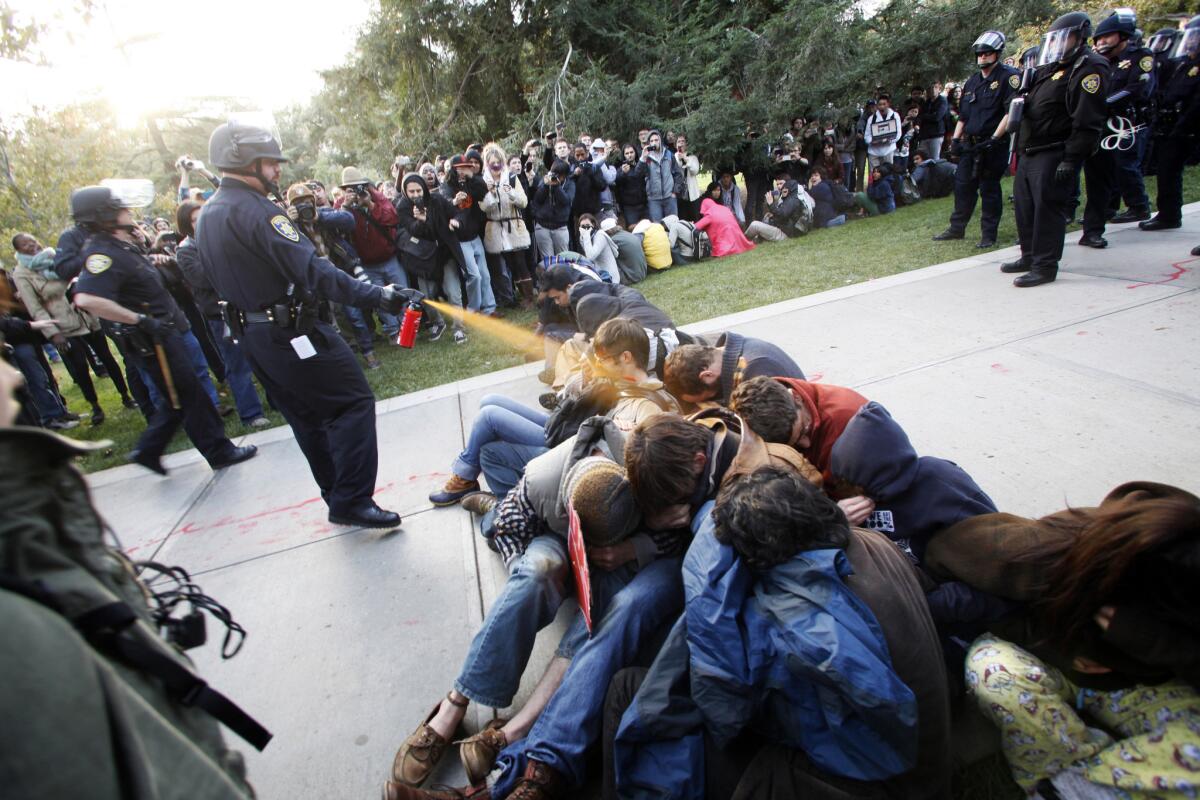UC Davis spends $175,000 to sanitize its online image after ugly pepper spray episode

- Share via
UC Davis paid consultants at least $175,000 to clean up its online image after students and alumni were pepper sprayed by campus police during an otherwise peaceful protest in 2011.
Newly released documents obtained by the Sacramento Bee show the university worked to clean up both its own image and that of Chancellor Linda Katehi.
In one case, UC Davis worked with Maryland company Nevins & Associates on a six-month contract that paid $15,000 a month, according to a copy of the contract. That contract was signed in January 2013, just a few months after the UC regents agreed to pay a settlement to 21 UC Davis students and alumni who sued the university.
The widely criticized November 2011 incident, captured in videos that quickly went viral on the Internet, triggered nationwide controversy about the forceful response by university police to student protesters.
The videos showed an officer spraying seated students directly in their faces at close range during an Occupy rally. At the time, the Occupy Wall Street movement had spilled onto college campuses, combining with student anger over rising tuition and cuts to higher education to spur protests and sit-ins.
In addition to public outrage, the episode also spawned a raft of Internet memes that featured the “casually pepper spray everything cop.”
As part of its contract, Nevins & Associates said it would work to remedy the “venomous rhetoric about UC Davis and the chancellor” through “strategic placement of online content.”

UC Davis Chancellor Linda Katehi is escorted from the stage after speaking about the pepper-spraying incident on campus in 2011.
The company agreed to launch an aggressive and comprehensive online campaign to eliminate negative search results through modifications to “existing and future content” and by creating more original content as needed.
One means of doing this, the company said, is by diluting negative viral content with a surge of positive stories on different topics. Nevins & Associates also suggested UC Davis adopt Google platforms to “expedite the eradication of references to the pepper spray incident in search results.”
In June 2014, the university awarded the PR firm IDMLOCO a contract for $82,500 to design a “comprehensive search engine results management strategy.” The documents outlining the contracts were released to the Sacramento Bee in response to requests filed under the California Public Records Act.
IDMLOCO said it would be able to achieve a “reasonable balance of positive natural search results” and identify “key messages and themes” the company could use to counter negative results.
The company was awarded two more contracts last year — one for $8,000 a month up to a limit of $96,000 and another for $22,500 a month, or a maximum of $67,500.
Under those contracts, IDMLOCO said it would create an “integrated social media program for executive communications” and provide “an assessment of the University’s Strategic Communications redesign.”
In a statement Thursday, UC Davis officials said that reporting on the “value” of the campus was an important part of overall communications strategy.
“It is important that the excellent work underway at UC Davis with respect to educating the next generation of students, pursuing groundbreaking research, and providing important services to the state is not lost during a campus crisis, including the crisis that ensued following the extremely regrettable incident when police pepper-sprayed student protesters in 2011,” the statement said.
Police at first contended that the spray was the most appropriate tool on hand to deal with what they described as an unruly mob encircling the officers.
However, a UC report in April 2012 declared that the pepper spraying violated policy and that school leaders badly bungled the handling of that campus protest. The investigating task force strongly rebutted campus police claims that the Occupy demonstrators who had pitched tents on a UC Davis quad posed a violent threat.
In 2013, the former UC Davis police officer who pepper sprayed the campus protesters received $38,055 in workers’ compensation after claiming he suffered depression and anxiety as result of the public outcry.
John Pike, who had filed for the compensation from the University of California system, also cited the stress he endured from death threats he received after the incident. Pike was fired in July 2012, after being on paid administrative leave for eight months.
On Thursday, Assemblyman Mike Gatto (D-Glendale) said it was time for Katehi to resign.
“The chancellor serving on the board of a textbook company was sufficient enough grounds to suspect that the best interests of the students weren’t being served,” Gatto said in an emailed statement. “But the recent disclosure that the university made substantial, questionable PR expenditure cemented it in my mind.”
The contracts demonstrate an extensive effort to quell the storm of negative publicity that followed.
Online reputations in particular are important to manage because of the sheer volume of people who surf the web, said Ira Kalb, an expert in branding, image creation and marketing at USC. Managing these reputations and protecting them from being “hijacked” is a growing field, he said.
“Online is really an interesting thing because there are people who say all sorts of things,” he said.
Certain software enables firms to pick up feeds from social media, Kalb said. The software detects when a company’s name is mentioned and analyzes if it’s a positive or negative comment.
Gatorade, for example, has a “mission control” room to monitor online feeds from Twitter and Facebook, Kalb said. The company uses any positive reviews they find for their marketing campaigns and works to fix any negative reviews they see to “get ahead of the story.”
“It’s very important to manage a reputation, and people often don’t realize that,” Kalb said. “So many companies have been seriously damaged for not having a strategy for handling this.”
For more local and breaking news, follow me on Twitter: @sarahparvini
ALSO
California doesn’t have enough housing, and lawmakers aren’t doing much about it
U.S. extends limited reduction of mortgage principals for stressed homeowners
City records show that Uber and Lyft have devastated L.A.’s taxi industry
More to Read
Sign up for Essential California
The most important California stories and recommendations in your inbox every morning.
You may occasionally receive promotional content from the Los Angeles Times.











